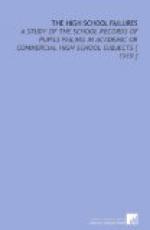More than 20 per cent of the grades in the former and nearly 20 per cent of the grades in the latter distribution are A’s or B’s, 52 per cent more in each case are given a lower passing grade, while approximately 28 per cent in each distribution have failing grades. Though some tendency toward a continuity of failures is apparent, there is also evident a pronounced tendency in the main for pupils to succeed. That these same pupils could do better is not open to doubt. Teachers in two of the larger schools asserted that with many pupils a kind of complacency existed to feel satisfied with a C, and to consider greater effort for the sake of higher passing marks as a waste of time. Such pupils openly advocate a greater number of subjects with at least a minimum passing mark in each, in preference to fewer subjects and the higher grades, which they claim count no more in essential credit than a lower passing grade. That attitude may account for some of the low marks as well as for some of the failures shown above, even though the pupils may possess an abundance of mental ability.
Still another element, apart from the real ability of the pupils, which is contributory to school failures is found in punitive marking or in the giving of a failing grade for disciplinary effect. It is probably a relatively small element, but it is difficult to establish any certain estimate of its amount. Numerous teachers are ready to assert its reality in practice. Two cases came directly to the author’s personal attention by mere chance—one, by the frank statement of a teacher who had used this weapon; another, by the ready advice of an older to a younger teacher, in the midst of recording marks, to fail a boy “because he was too fresh.” The advice was followed. Such a practice, however prevalent, is intolerable and indefensible. If the school failure is to be administered as a retaliation or convenience by the teacher, how is the moral or educational welfare of the pupil to be served thereby? It is certain to be more efficacious for vengeance than for purposes of reforming the individual if employed in this way. The Regents’ rules take recognition of this inclination toward a perversion of the function of examination by forbidding any exclusion from Regents’ examinations as a means of discipline. Many teachers cultivate a finesse for discerning weaknesses and faults, without perceiving the immeasurable advantage of being able to see the pupils’ excellences. In one school there was employed a plan by which a percentage discount was charged for absence, and in some instances it reduced a passing mark to a failing mark. This comes close to the assignment of marks of failure for penalizing purposes, which is unjustified and vicious.




